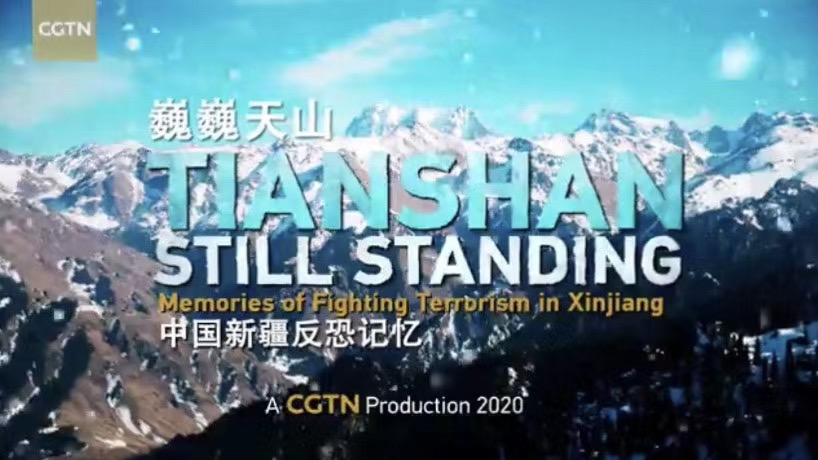

When the exclusive documentary “Tianshan Still Standing: Memories of Fighting Terrorism in Xinjiang” was broadcast by CGTN on June 19, some viewers commented that it “reveals terrorism with blood and tears.”

The documentary is powerful because it is real. It presents the astounding stories of those who defend peace, survivors and even people who have inflicted harm.
Thousands of terrorist attacks took place in China's Xinjiang Uygur Autonomous Region between 1990 and 2016.
Over the past three decades, terrorist groups, such as the East Turkestan Islamic Movement (ETIM), have been manipulating Xinjiang locals, who generally have low levels of education, into perpetrating a number of terror attacks, resulting in a number of tragedies. It was only in the last three years that the violence has been prevented.
No violent terrorist attacks have occurred in Xinjiang for the past 40 consecutive months, and right to life and the right to the development of people of all ethnic groups in Xinjiang have been efficiently guaranteed.
“Those who have not watched the 60-minute documentary have no right to point fingers at Xinjiang’s counter-terrorism efforts,” some people said after watching the documentary.
The documentary is the third in a series released by CGTN. The previous two, which aired last December, have been played by more than 1 billion times. In non-English speaking countries such as Russia, Japan and some Middle Eastern countries, the two documentaries sparked heated discussions.
China is fighting against terrorism and extremism – the biggest threats to Xinjiang, remarked the website of Italian newspaper Il Giornale.
Regrettably, no mainstream Western media have covered the two documentaries. Despite constantly scrutinizing the Xinjiang issue, they have now collectively gone silent.
In addition, Youtube restricted viewer access to and removed the two documentaries for so-called violation of rules. At a press conference held by China’s Ministry of Foreign Affairs, when the spokesperson asked if any of the foreign correspondents present had seen the documentaries, none of them replied that they had.
The awkward response from the foreign media to the documentaries is confusing. Are these media outlets so shocked by the facts and truth that they don’t know how to continue lying to the world about the situation in Xinjiang? Or do the tragedies portrayed in the documentaries prove that those media outlets’ condemnation of the anti-terrorism and de-radicalization measures in Xinjiang is totally groundless?
As the Western world continues to criticize anti-terrorism and de-radicalization efforts in Xinjiang, they should watch the documentary in order to become less ignorant and have some respect for the lives of Chinese people. It they have ulterior motives, then they will definitely continue to pretend to be deaf and dumb on the issue.
We’ll see how they react.
 Fire brigade in Shanghai holds group wedding
Fire brigade in Shanghai holds group wedding Tourists enjoy ice sculptures in Datan Town, north China
Tourists enjoy ice sculptures in Datan Town, north China Sunset scenery of Dayan Pagoda in Xi'an
Sunset scenery of Dayan Pagoda in Xi'an Tourists have fun at scenic spot in Nanlong Town, NW China
Tourists have fun at scenic spot in Nanlong Town, NW China Harbin attracts tourists by making best use of ice in winter
Harbin attracts tourists by making best use of ice in winter In pics: FIS Alpine Ski Women's World Cup Slalom
In pics: FIS Alpine Ski Women's World Cup Slalom Black-necked cranes rest at reservoir in Lhunzhub County, Lhasa
Black-necked cranes rest at reservoir in Lhunzhub County, Lhasa China's FAST telescope will be available to foreign scientists in April
China's FAST telescope will be available to foreign scientists in April "She power" plays indispensable role in poverty alleviation
"She power" plays indispensable role in poverty alleviation Top 10 world news events of People's Daily in 2020
Top 10 world news events of People's Daily in 2020 Top 10 China news events of People's Daily in 2020
Top 10 China news events of People's Daily in 2020 Top 10 media buzzwords of 2020
Top 10 media buzzwords of 2020 Year-ender:10 major tourism stories of 2020
Year-ender:10 major tourism stories of 2020 No interference in Venezuelan issues
No interference in Venezuelan issues
 Biz prepares for trade spat
Biz prepares for trade spat
 Broadcasting Continent
Broadcasting Continent Australia wins Chinese CEOs as US loses
Australia wins Chinese CEOs as US loses